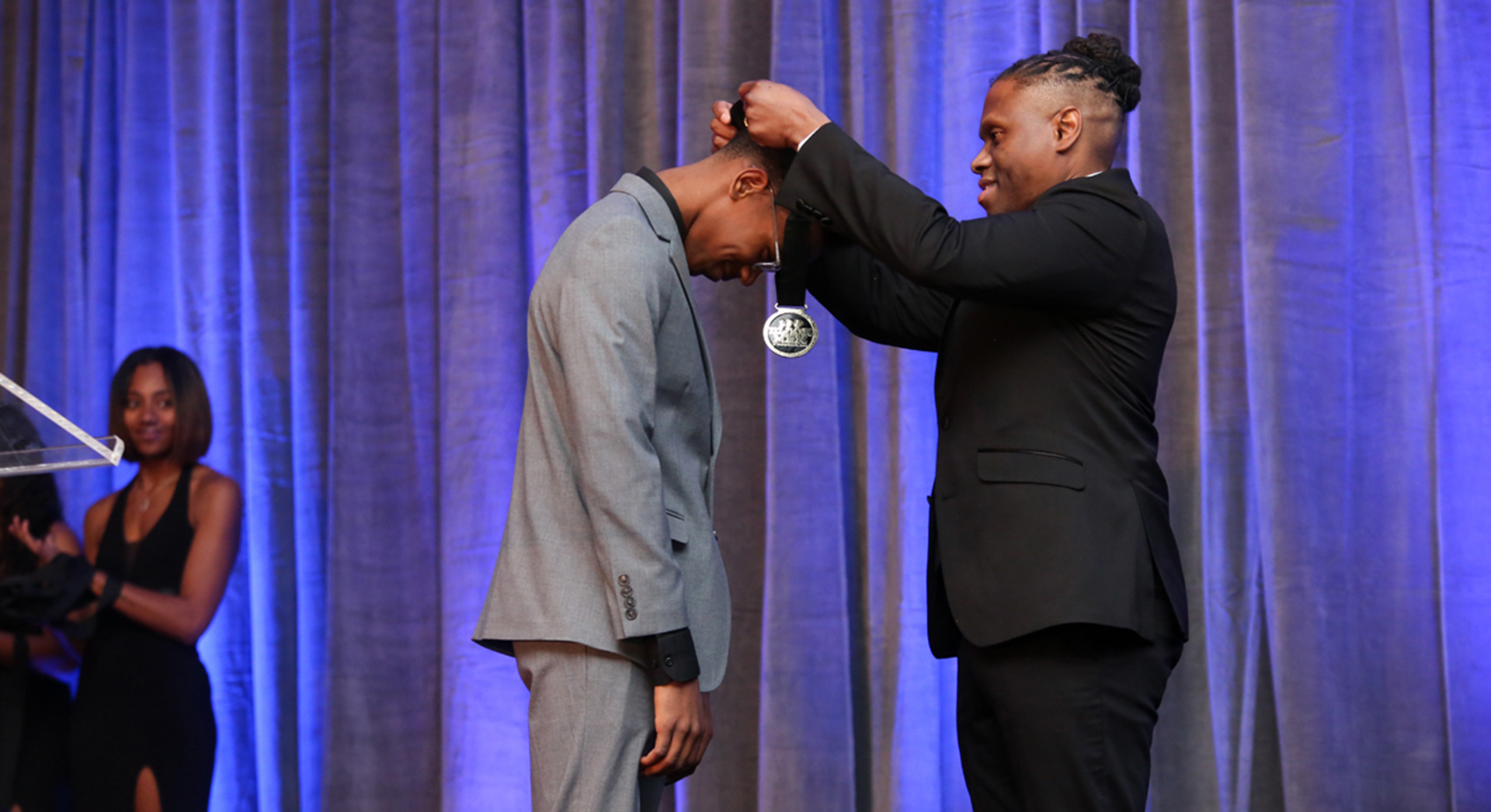STEM Recruiter Keithen Stallings springs out of bed every day at 4:30 a.m. Even with the early start, the East St. Louis, Illinois, native knows there aren’t enough hours in the day to help everyone he wants to support, but he’ll do his best with the time he has.
Stallings is energized by the potential of the next generation—the people he recruits for Science, Technology, Engineering, and Math (STEM) roles through Danaher’s University Recruiting program as well as those he mentors as Founder and President of The Access Foundation and as President of 100 Black Men of St. Louis. Whether he’s supporting underprivileged kids in STEM education or mentoring local adults, Stallings remains focused on reaching as many people as possible, driving inclusion in STEM, and maximizing his impact.
As Stallings puts it: “I believe that what people see is what they’ll be, so I try to be the best version of myself and inspire others to do the same.”
Charting a Course
Growing up in East St. Louis, Stallings attended a public school among poverty-stricken neighborhoods. While he had a lot of great teachers, there were many obstacles and a lack of resources in the schools and community. He credits his mom, a single parent who worked several jobs while raising three boys on her own, for his work ethic and leadership skills.

“When I was growing up, you really had to be intentional about the choices you made and the path you took. I needed to have a plan to graduate from high school, to go to college, and to do something better than what I’d seen around me. I was blessed to have my mom and older brother—two people who guided me in the right direction,” says Stallings.
After graduating from Illinois State University—the first in his family to earn a college degree—Stallings continued to chart a course for his future. He returned to his community to help others fulfill their own potential.
In 2017, Stallings’ sense of duty and passion for helping others inspired him to found The Access Foundation, a nonprofit organization committed to providing kids with access to education and STEM resources. Stallings draws on his own background to coach students from kindergarten through high school and into college. “A lot of these kids are in situations that they don’t know how to handle. They need encouragement to realize their potential,” he says. In 2019 alone, 1,200 kids participated in the Access Foundation’s leadership academies and other events.

Stallings is fueled by encouragement and gratitude from the students he mentors and their parents. “Sometimes I don’t realize the impact I’m having until I hear it from someone else,” Stallings says. Recently, a mentee texted Stallings about earning a 3.5 GPA. And the mother of a mentee, whom Stallings had mentored for five years, thanked him on Facebook; her son had just been awarded Mentee of the Year by the 100 Black Men of St. Louis, and Stallings had presented the honor himself. The mother shared that Stallings took her son to his first Rams game in 2014 and praised him for “showing up” when her son needed it most.
Colleagues at Danaher appreciate Stallings’ contributions and feel inspired by his dedication to making an impact. “As people leaders, we have a responsibility to create an environment where associates can bring their whole selves to work,” says Nicole Wormley, Director of Talent Branding and University Recruitment. “Keithen’s commitment to St. Louis is a part of who he is. I’m so proud of his accomplishments for Danaher, and I’m equally proud of the many ways he contributes to his community.”
An Opportunity for Impact
Stallings has worked as a university recruiter for nearly two decades—and when he saw the chance to lead STEM recruitment at the university level for Danaher, he seized the opportunity to impact STEM recruiting and inclusion initiatives on a national scale.
Stallings was impressed by Danaher’s focus on continuous improvement. “ I knew I could come here and be successful,” he says. “Danaher provides me with the flexibility to build programs like the STEM Ideas Program,” which offers new grads an in-depth, fast-track path to STEM leadership. “Even though I’m in my first year,” Stallings says, “I’ve been encouraged to make the changes to the program that I thought were needed. We’re always focused on making things better.”
Right now he’s focused on a biomedical engineering initiative, traveling to colleges around the country to promote Danaher’s rotation program and to teach students about high-visibility, fast-track positions at Danaher. Stallings views his job as equal parts recruiter and coach, and says he spends a lot of time reminding students of their capabilities.

“The ways students work today will simply blow the minds of the average employee,” Stallings says. “I remind the students I meet that they’re at the cutting-edge of technology and they should take full advantage of it. But how they show up is important, too. I tell them to practice speaking with friends and to practice in the mirror. Every interaction they have is part of the interview process. Every conversation matters. I encourage them to bring everything they have to the table,” he says.
Pursuing a More Inclusive Future
Today’s students grew up with technology at their fingertips, and it’s their skills and potential that give Stallings hope for the future. While he’s seen great progress since he started his career, there’s more work to be done to drive equity in opportunities, especially in underprivileged communities and for people of color, Stallings says. The lack of resources in certain communities and the increasingly high cost of education and student debt remain barriers to inclusivity in STEM fields.
But Stallings sees glimmers of hope for kids who might not have the opportunity or financial resources to take traditional paths from high school to college to the workforce. He works with LaunchCode, an organization that offers free training for technology jobs in major cities around the U.S. And through the 100 Black Men’s Youth Ambassador program, students aged 8 to 18 complete a curriculum focused on conflict resolution, problem-solving, and goal-setting.
On the Access Foundation’s “Super STEM Saturdays,” Stallings takes high school students to local colleges to teach them the steps to get into college—and to show the reality of the possibilities in front of them. “Lots of students don’t have that foundation or a guide to let them know what it takes to get into college,” he says. “It’s a multi-year process. You can’t wait until your senior year to decide you want to go.”
At Danaher, recruiters cast a wide net in hopes of finding candidates from a range of backgrounds and communities. When Stallings attends career fairs and hackathons, he focuses on skills and potential, not credentials or appearances. “We have to recognize that some of the traditional methods of recruitment may not work with the new generation. We need to play in their space and to make them comfortable being who they are,” he says.
Committed to a Life of Influence
If his own life is any indication, the students that Stallings mentors have a real chance to accomplish anything they set their minds to.
“I think every person is put on earth to make it just a little bit better, every employee should have that same mentality. The work we do at Danaher naturally has a great impact. Everyone who joins gets a chance to contribute to Danaher’s larger purpose.”
While he hasn’t found a way to add more hours to the day, Stallings is determined to squeeze the most out of each one. “My work doesn’t have boundaries. I try to help as many people as possible, professionally and personally.”

Leave a Reply